Registration is now open for the GCI 2013 International Conference being held this summer in Orlando, Florida. For information about the conference and to register go to http://2013.gci.org/.
Author: GCI Media
Church planting networks
Through its Church Multiplication Ministries (CMM), GCI Church Administration and Development helps church districts form church planting networks. In these networks, multiple congregations team up to help start new churches. In the video below, the pastors leading one of these networks in Southern California discuss their progress.
Solomon Islands update
This update is from Rod Matthews who is GCI missions director in Southern Asia and the Pacific.

GCI is blessed with some marvelously remote congregations, including the one in the village of Qiloe (pronounced ‘gee-low’) located on the island of Ranongga in the Pacific nation of Solomon Islands. Most of Qiloe’s residents belong to our GCI congregation—it is traditional in Ranongga that all villagers belong to one denomination.
 Recently, my wife Ruth and I visited Qiloe for their annual family festival. It was quite a trip, with a 3½ hour flight followed by a couple of boat rides (with beautiful views like that shown at left). We were accompanied by Henry and Elisabeth Kuper. Henry is our national coordinating pastor for the Solomon’s. He retired from the Solomon’s National Police Force some years ago, and served for a time as aide-de-camp to the Governor General.
Recently, my wife Ruth and I visited Qiloe for their annual family festival. It was quite a trip, with a 3½ hour flight followed by a couple of boat rides (with beautiful views like that shown at left). We were accompanied by Henry and Elisabeth Kuper. Henry is our national coordinating pastor for the Solomon’s. He retired from the Solomon’s National Police Force some years ago, and served for a time as aide-de-camp to the Governor General.
During the four-day festival, we had the privilege of ordaining a second elder for the Qiloe congregation, Allowin Ketohebala. He is a fine younger man who has demonstrated his integrity and service to the people of Qiloe. He is also an excellent help with the large number of youth in the church.
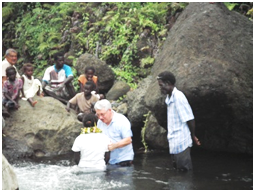 I had gone to Ranongga anticipating one baptism but found on arriving that there were three other young people waiting for baptism too. We had to walk about 20 minutes through thick tropical vegetation to reach a clear stream coming out of the hills that had a pool deep enough for the baptisms. On arrival I discovered that some ladies had preceded us and built a small wall of stones across the stream to deepen the pool. It was an inspiring natural location to witness their public acceptance of Christ as Savior and Lord and to celebrate their part in the Body of Christ.
I had gone to Ranongga anticipating one baptism but found on arriving that there were three other young people waiting for baptism too. We had to walk about 20 minutes through thick tropical vegetation to reach a clear stream coming out of the hills that had a pool deep enough for the baptisms. On arrival I discovered that some ladies had preceded us and built a small wall of stones across the stream to deepen the pool. It was an inspiring natural location to witness their public acceptance of Christ as Savior and Lord and to celebrate their part in the Body of Christ.
On our final evening, we had a traditional “Island Night” of songs and dancing with a banquet of local dishes and fresh fish. The children sang and groups danced with humor and skill, including the “gecko dance,” which imitates the little insect-eating lizard that lives in every home.

When we left, virtually the entire church bid us farewell at the shore. We left a growing church, a new elder and over 70 members led by Pastor Derek Jiru and his wife Pinque. They touched our hearts forever.
We are thankful for all our members in the Solomon Islands. They are a wonderful example of dedication and faithfulness. We’re also thankful for Doug and Marg Lewis from Melbourne, Australia who for over a decade made an annual trip to the Solomons as our national pastoral coordinator—lovingly guiding our members through our theological transformation. Doug still helps in keeping our members in the Solomons connected to our international fellowship.
In search of knowledge
Dear Brothers and Sisters in Christ,
 Author and evangelist Ravi Zacharias tells of being a graduate student when a new edition of Encyclopædia Britannica was released. It was a massive work that had taken 14 years to produce and he remembers being fascinated by the statistics: 200 advisors, 300 editors, 4,000 contributors, over 100,000 entries, 34 million dollars and 43 million words. In the last pages of that work, one of the editors had the audacity to conclude: “Herein contains the entirety of human knowledge.”
Author and evangelist Ravi Zacharias tells of being a graduate student when a new edition of Encyclopædia Britannica was released. It was a massive work that had taken 14 years to produce and he remembers being fascinated by the statistics: 200 advisors, 300 editors, 4,000 contributors, over 100,000 entries, 34 million dollars and 43 million words. In the last pages of that work, one of the editors had the audacity to conclude: “Herein contains the entirety of human knowledge.”
It didn’t, of course. It has been estimated that human knowledge doubles at least every five years. So in the 14 years it took to produce the encyclopedia, knowledge would have doubled and redoubled itself several times. So where is the “entirety of human knowledge” contained—Google perhaps? No, even with its amazing knowledge-mining capacity, Google can’t keep up.
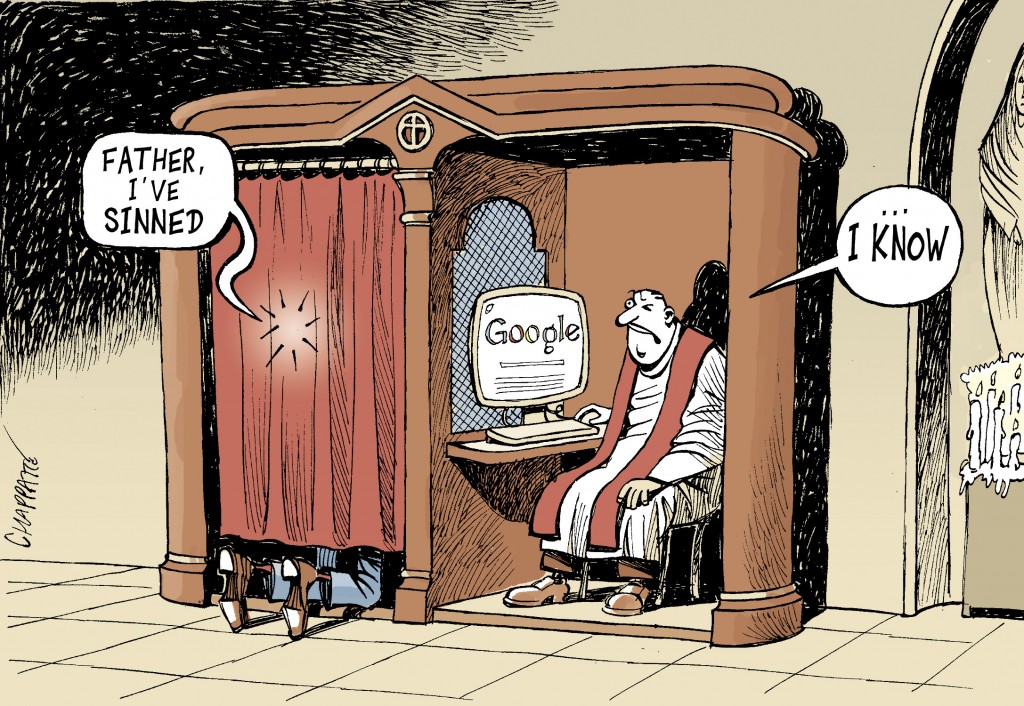
The Bible makes no such boast, though it says this about God: “Great is our Lord…his understanding has no limit” (Psalm 147:5).
The Bible contains many stories of people, who in encountering God discovered the depth of their lack of knowledge and understanding. For example, when Jacob dreamed of meeting God at the top of a great ladder, his first words upon waking were: “Surely the LORD is in this place, and I was not aware of it” (Genesis 28:16).
Then there was Sarah’s maidservant Hagar who having fled Sarah’s abuse was amazed when God spoke to her, telling her to return home. Genesis 16:13 gives her reaction: “She gave this name to the LORD who spoke to her: ‘You are the God who sees me,’ for she said, ‘I have now seen the one who sees me.’”
We used to say, “the camera doesn’t lie”—but that was before Photoshop. And we used to say, “seeing is believing”—but that was before sophisticated scientific instruments revealed a world beyond the limits of our human senses. No matter how far we probe into the atom or out to the edge of the universe, there is always more. As a result, much of what we now understand to be the nature of physical reality seems so unreal. Therefore, it is pompous to boast that anything we produce contains the entirety of human knowledge. And it is even more ridiculous to claim that we fully understand God, particularly if our knowledge leads in the direction of atheism.
The Christian faith acknowledges and even takes joy in deep mysteries beyond our powers of comprehension. Jesus tells us that “No one knows the Son except the Father, and no one knows the Father except the Son…” (Matthew 11:27a). But mystery does not rule out a true knowing of God—an apprehension, if not a comprehension, of who God is. Jesus goes on to say why: “…and those to whom the Son chooses to reveal him” (verse 27b).
The fact that human beings cannot know God on their own power does not mean that God cannot make himself known to his human creatures. The early church had a saying: “Only God knows God, only God reveals God.” The transcendent God of the universe has done just that, personally revealing himself in his incarnate Son. The witness of the Christian church is not that we have found God, but that God has revealed himself to us in Jesus Christ.
Karl Barth once wrote: “In our hands even terms suggested to us by Holy Scripture will prove to be incapable of grasping what they are supposed to grasp.” However, as Cyril of Alexandria once said, “when things concerning God are expressed in language used of men, we ought not to think of anything base, but to remember that the wealth of divine Glory is being mirrored in the poverty of human expression.” So we must remember that even the words of the Bible, borrowed from human understanding and experience, refer beyond themselves to divine realities that far exceed the words themselves and the creaturely realities they come from.
Holy Scripture preserves for us a record of God’s acts of revelation, beginning with the prophets of ancient Israel and culminating with the apostles whom Jesus appointed. Those narratives and teachings introduce us to a God who makes known God’s invisible presence, even if now we “see through a glass darkly,” as the apostle Paul described it.
Such revelation does not tell us all that can be known about everything, but it is always profound in what it does proclaim. It is only because of the working of the Holy Spirit in and through Holy Scripture that we are put in actual contact with the living God and can hear this God speak again to our spirits. So, although the Holy Spirit does not speak directly of himself, he nevertheless goes where God wills, to surprise, to comfort and to reveal. Whether in Jacob’s dream or Hagar’s distress, God makes himself known and gathers people who respond to his outgoing love. God told Jeremiah, “Call to me and I will answer you and tell you great and unsearchable things you do not know” (Jeremiah 33:3).
As we mature spiritually, we realize that there is much we do not know. While this makes us want to know more, we also realize that it is a relief to accept that there is much that we do not and cannot know. Our lack of knowledge and understanding keeps us looking to the One who knows it all, who wills to be known and has made himself known in Jesus Christ.
In this coming year, there will be many unknowns. The world economy will continue to cough and sputter along. Wars and rumors of wars remain a fact of 21st-century life. There will be catastrophes and technological advancements. Scientists will make discoveries, some of which will overturn previous understanding.
I pray that Grace Communion International will grow ever more sensitive to God’s leading in our lives. I pray that we respond as he shows us how he wants us to co-minister with Jesus in new and exciting ways that will shine light into the darkness as signs of the promise that God will make all things new.
With love in Christ’s service,
Joseph Tkach
Religious polarization
This update is from Charles Fleming, GCI mission director in the Caribbean. He shares excerpts from “Welcome to Religious Polarization,” an article by Canadian author Reginald Bibby. The article discusses how we wrestle to find new expressions for the church in a changing world. You can read the full article at http://www.alban.org/conversation.aspx?id=10100.
The Pew Forum on Religion & Public Life announced that “nones” [those with no religious affiliation] are “on the rise” and “growing at a rapid pace.” [Click here for the Pew Forum reports] Some 20 percent of Americans, including a third of adults under 30, “have no religious affiliation”….
The immediate interpretation… is that secularization, so familiar to Western Europe, Canada, and elsewhere, has caught up to the United States. Further, given that Millennials are the least affiliated generation in American history and unlikely to affiliate as they age, the “religious recession” is not about to end anytime soon.
No question—the percentage of Nones is up, but partly because of cultural inflation. These days, people who don’t belong and don’t believe can tell things the way they are…..
From the 1970s through the 1990s, we chalked things up to secularization… [however] I now am convinced that neither secularization nor revitalization theories accurately describe what is taking place in Canada and elsewhere, including the United States. Global data make it very clear that, in every society across the planet, religion persists—along with the inclination of some people to take a pass on religion.
Therefore, rather than speaking of one-way trends toward secularization or revitalization, it seems more accurate and helpful to view pro-religion and no-religion as the poles of a dynamic continuum. At any point in time, a society’s inclination to opt for one over the other will vary, depending on “pro-religion” and “no-religion” factors that are organizational and cultural in nature. But the proclivity to opt for religion will always co-exist with the proclivity to reject it, with noteworthy numbers of people occupying something of an ambivalent middle.
…In using the term [polarization], I am speaking simply of the inclination of populations to embrace religion versus reject it…. While some observers may be startled by the growth of Nones in the United States and see ongoing secularization as virtually inevitable, I am not among them. The reason is that so-called “American religious exceptionalism” is simply proving not to be so exceptional after all. Historically, the religious polarization continuum in the U.S. has been weighted heavily on the pro-religion side. Currently, there is some modest movement in the direction of the no religion side. Such balance between religion and no religion is universal.
But, as with elsewhere, the story is hardly final and we need to keep the camera running. The religion market is always “up for grabs.” Following [historian Rodney] Stark, the increase in the percentage of Nones means the opportunity exists for religious groups to increase their market shares. Apart from outcomes, there is little doubt we will see accelerated activity in the American religious marketplace.
An important word of caution: my research in Canada has been showing, that, at least to date, residence in the no religion category often tends to be short-lived. Many teenage Nones are looking to religious groups for rites of passage that may result in reaffiliation. Nones who marry “Somethings” frequently raise their children as “Somethings” and not uncommonly follow suit. Further, large numbers of adult and teenage Nones indicate they have not slammed the door on involvement that they deem to be worthwhile.
In Canada, the reality of religious polarization is a far cry from what was anticipated by theories of linear secularization. It is literally A New Day for religion, where market demand remains high, precisely at a time when growing numbers are rejecting religion. Changing demographics and varied market performances are contributing to a restructuring of players. But the inclinations to embrace religion and reject religion co-exist, with the balance always in dynamic flux. Such religious polarization, as I’ve been emphasizing, is found everywhere–even now, as the Pew Forum data remind us, in the United States.
A cause for pause? The inclination of Americans to opt for “pro-religion” or “no religion” will depend largely on how the nation’s religious groups collectively respond with life-enhancing ministry. The news of the rise in Religious Nones does not signal demise and doom for religion. On the contrary, it signals new opportunities, and the need for appropriate responses.
Mark Queener
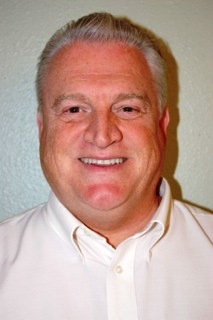
Before becoming a part of WCG/GCI, Mark Queener was an on-air radio and television personality. “I worked in radio as a sports anchor, disc jockey, newscaster, announcer and play-by-play sportscaster. In television, I was a news and sports reporter and a sports anchor.”
Mark, who now pastors the GCI church in Belleville, Illinois, has been married to his wife Rhonda (Staples) for 36 years. They have two sons, Scott (Cindie) and Brian (separated), and four granddaughters: Hannah, Sophie, Reagan and Brielle. All of the above attend the Belleville church. Mark mentions that having four granddaughters is notable in the Queener family: “My parents had three sons and no daughters. My wife and I had two sons and no daughters. Now, our two sons have nothing but daughters. My wife and my mother, finally, got their girls! (and the Queener men seem pretty happy about it, too).”
Mark grew up in Mascoutah, Illinois, but loved spending his summers at his aunt’s home in the hills of eastern Tennessee. “There was no indoor plumbing. But using the outhouse and taking a bath in a washtub were all part of the adventure, as my cousins, their friends, my brothers and I hiked all over the mountains, armed with BB guns and fishing poles.” As an older teen, Mark toured the country as a member of the Belleville Black Knights Drum and Bugle Corps, one of the top-ten horn lines in the country.
Mark enlisted in the army at age 20 and spent six years in active duty in Korea, Texas, Massachusetts and Germany. “After spending about 10 years of my adult life away from Mascoutah, I decided to return there in the summer of 1985. I’ve lived there ever since. I spent a couple of years as an administrator at a local community college. But I’ve worked for the Department of the Air Force at nearby Scott Air Force Base, Illinois, since July 1989.”
In the early 80s, while working on his bachelor’s degree at Southern Illinois University in Carbondale, Mark picked up a copy of The Plain Truth at a supermarket. “I subscribed to the magazine, ordered all the free literature I could get, and began to watch The World Tomorrow program on television. After I graduated from college, I took a job in Joplin, Missouri, where I attended a Plain Truth Bible lecture. I started attending Worldwide Church of God worship services and Bible studies in spring 1985, as part of the Joplin, Missouri congregation. Within a couple of months, I moved to the Belleville, Illinois church area and was baptized there in December of that same year.”
In the mid 90s Mark completed a survey WCG leaders were using to determine who might be interested in, and qualified for, pastoral ministry training. “I was ordained an elder in March 1996. Belleville pastor Jim Stokes and our district superintendent, Bob Taylor began training me in pastoral ministry for the next several years. Eventually, they discussed with me and confirmed with the congregation a plan to have me succeed Mr. Stokes as senior pastor when he retired. I became the assistant pastor of the Belleville church in September 2001 and its senior pastor in July 2004.”
When asked about mentors, Mark mentioned two people. “My district pastor, Karl Reinagel, is a great encourager and friend. I learn a lot from his example, just watching how he handles different issues and situations. But, perhaps, the person who has had the most influence on me in ministry is Jim Stokes. He groomed me to be his successor as a senior pastor. One of the ways he did that was by decreasing his role and allowing mine to increase. However, above and beyond sharing everything he could from his ministerial training and experience, he also poured his life lessons into me as a good father does with a willing son. Thanks a million, Pastor Pops!”
Mark enjoys being a pastor. “I really enjoy teaching others as I have been taught, especially when it leads to discussions about what God is doing and how he’s working in people’s lives. It’s very rewarding and encouraging to watch and hear people go deeper in their understanding of God and what he’s done and is doing for all people.” This fits right in with Mark’s passion: “I love to see people excited about Jesus – who he is, what he’s doing and how much he loves them. When God involves me in any part of that, even if it’s just to be a witness to it, I feel super blessed.”
Mark’s most memorable moment as a pastor came following a funeral he had preached for a woman in his congregation. “The woman’s niece gave me a tear-filled hug and told me what a comfort I had been to her throughout the entire process of her aunt’s death, visitation and funeral. I didn’t know the niece well and didn’t remember saying all that much to her personally. It was a tremendous lesson about how Jesus already was there, doing his work to comfort people in their grief. That was many years ago, but the convicting power of that experience still resonates deeply in me today.”
What Mark enjoys most about being part of GCI is that “our denomination seems committed to training and equipping us to be ready to participate with Jesus in whatever he’s doing and wherever he’s doing it. Also, our connectedness builds great camaraderie and positions us to work well together and to respond quickly to different situations across the country and around the world. And it’s exciting, as we embrace Trinitarian theology, to know that the gospel is such great good news for everyone!”
Mark says he feels closest to God in different ways. “I really connect with God through songs of praise to him, be it contemporary music or traditional hymns. And being outdoors in his creation really does it for me, too. But I also have to mention those times when one of my young granddaughters says something that reflects the mind of Christ. It may be simple, but it’s often wise enough to stop the rest of us in our tracks and marvel at what God has put in her heart above and beyond what she may have learned from someone else.”
Converge: GenMin summit
 The annual summit of Generations Ministries is now known as Converge. This gathering has always been a highlight for attendees. It brings together GenMin camp and mission event directors, camp leadership teams, GCI youth and children’s workers, pastors and emerging young leaders.
The annual summit of Generations Ministries is now known as Converge. This gathering has always been a highlight for attendees. It brings together GenMin camp and mission event directors, camp leadership teams, GCI youth and children’s workers, pastors and emerging young leaders.
This year, Converge will be held in two locations: California and Ohio.
- Converge West will be held in Montebello, California on February 1-3, 2013 at the DePaul Evangelization Center. Special guest will be Jeff McSwain, director of Reality Ministries. Registration for Converge West is open at www.gci.org/go/convergewest. There are two pricing options: $150/person (includes registration, two nights lodging and all meals); or $55/person (includes registration, 2 meals on Saturday with no overnight lodging). Mark and Anne Stapleton are the Converge West coordinators—you can reach them with any questions at convergewest@gmail.com.
- Converge East will be held in Marengo, Ohio on April 12-14, 2013. Jeff Broadnax is the coordinator. Additional information and online registration will be coming soon.
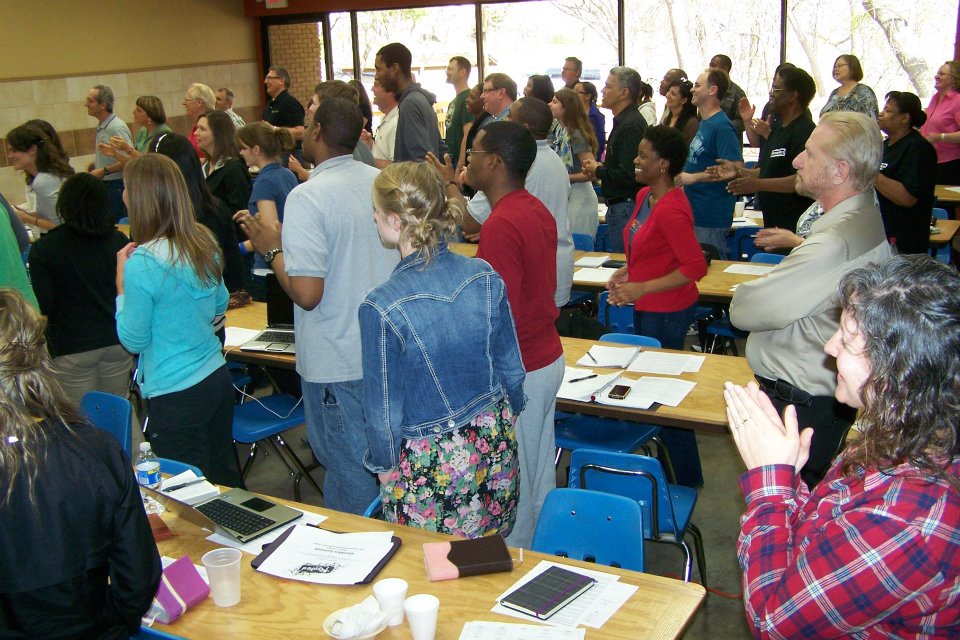
Christmas in Brisbane
This update is from GCI Australia pastor Bob Regazolli.

There was much excitement here at the GCI church in Brisbane, Australia. State of the Heart music minister Ross Jutsum led our Christmas service (Ross and his wife Tammy were in Australia to visit Ross’s family).
Ross provided a mixture of Christmas carols, a few songs of his own compositions, selected readings, a children’s section and a song in Swahili from members of our Congolese congregation. Ross’s daughter Lisa then spoke with us about her experiences as a missionary in the Congo. She also sang a song for us.
We had the highest attendance for a service here in about a decade – 154 people. I have never heard such positive comments from so many following one of our worship services. It was truly inspiring and wonderful to see so many joining in praises for our Savior and King.
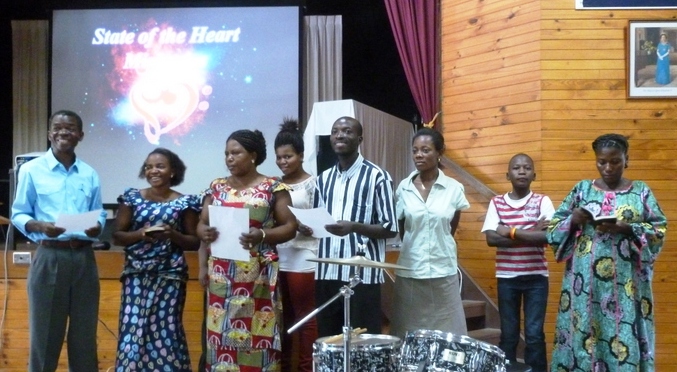
GCS registration now open
Registration for the spring semester at Grace Communion Seminary opens at 9 a.m. (Pacific time) on Wednesday, January 2 and continues through Sunday, January 13. You may register for one or more classes by going to http://www.gci.org/go/gcsspring13 and using your regular GCI online sign-in information. If you have any difficulties, please phone the GCS registrar at 800-851-2611.
Classes start on Monday, January 14, with the final lecture posting on Monday, March 18. Here are the courses being offered this coming semester:
- TH01 Nature of God and Jesus Christ
- BT02 Prophets
- NT04 Epistles of Paul
- CH01 Church History: The First Millennium
- CM03 Christian Counseling
- CM05 Women in Leadership
- TM01 Theology of Ministry capstone course (proctored Summative Exam required before registering for this course)
For information about these courses, go to http://www.gcs.edu/ and click on Course Descriptions (under Programs of Study) in the column on the left side of the page. There you’ll find short descriptions of all courses with links to course syllabi that list required textbooks.
Note: In compliance with accreditation standards, a number of GCS courses now have a final exam that must be proctored. This may require the use of a camera connected to your computer (for further information, please see pages 16-20 of the Student Handbook, accessible from the GCS website homepage).
Birth of Deddo’s grandson

This prayer update is from Gary and Cathy Deddo. Gary is special assistant to GCI president, Joseph Tkach.
Thanks for the prayers and well wishes concerning the birth of our first grandchild. We’re pleased to announce that Wesley Edward Tanis was born on December 28 to our daughter Linda and her husband Liam.
Wesley was 9 lbs. 3 oz. and 21 and 1/2 inches at birth.
There were some initial problems, but baby and mother are now home, doing well. For that we praise God!



